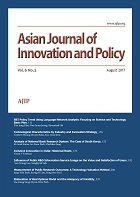 ISSN : 2287-1608
ISSN : 2287-1608
Suggestions for SME Policy for Sustainable Development
Abstract
This article is a suggestion for SME policy in Korea for the attention of the senior policy-experiencer of the whole nation, the Advisor to the President of Korea. This article is written from the perspective of technology policy experts, not SME experts. In spite of many SME policies, the issue of SMEs in Korea is worsening, not being resolved. Technology-oriented policies are effective for each company, but the role of SMEs is gradually decreasing in the Korean economy. Reflecting on this fact, I would like to suggest measures that include long-term, but social as well as educational. The solution I suggested is coexistence since sustainable growth through SMEs is not just an economic or social issue. It is a matter of survival. I propose four types of coexistence: corporate, local, human, and coexistence with nature. Getting coexistence works requires a change in social norms that mobilize even education.
- keywords
- SME policy, coexistence, socio-economic-cultural issue, technology-based SME policy
Reference
Apicella, S. (2018) 5G business potential from industry digitalization, ITU Seminar, Budapest, 2-4 July.
Balland, P.A., Boschma, R., Crespo, J. and Rigby, D.L. (2019) Smart specialization policy in the European Union: relatedness, knowledge complexity and regional diversification, Regional Studies, 53(9), 1252-1268, Available on https://doi.org/ 10.1080/00343404.2018.1437900
Choi, S.K., Lee, J.H., Hong, S.C. and Hong, U.S. (2018) Suggestions for SME-oriented national economy, Korea Small Business Institute, Basic Research, 18-22.
Directorate-General for Enterprise and Industry (2008) The Concept of Clusters and Cluster Policies and Their Role for Competitiveness and Innovation: Main Statistical Results and Lessons Learned, EU Commission.
EU, Smart Specialisation Platform - europa.eu, Https://s3platform.jrc.ec.europa.eu
Korea Small Business Institute (2019) KOSBI SME Trend.
Ko, C.R., Bae, S.J. and Seol, S.S. (2017) Suitability analysis of SMEs support means by customized information analysis, Journal of Korea Technology Innovation Society, 20-1, 81-102.
Moon, Y.H., Seol, S.S. (2017) Evaluation of the theory on the 4th industrial revolution, Asian Journal of Innovation and Policy, 6(3), 245-261.
Noh, M.S. (2019a) SME R&D investment status and prospect, SME Focus 19-02, 1.14.
Noh, M.S. (2019b) Comparative analysis of wage gap between big companies and SME in Korea and Japan, SME Focus 19-10, 4.22.
Park, J.S., Kang, J.W., Choi, J.M. and Hong, J.S. (2019) Analysis of supply chain aspects of SMEs in Japan by export regulations, Korea Small Business Institute, KOSBI SME Focus, 19-21, 9.9.
- Downloaded
- Viewed
- 0KCI Citations
- 0WOS Citations

